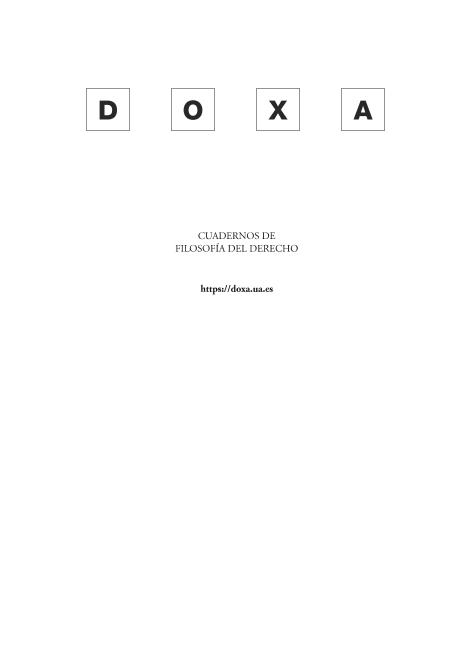Artículo
Afirma John Locke en el Capítulo VIII de su Segundo tratado sobre el gibierno civil que «todo hombre que tenga posesiones o disfrute de alguna parte de los dominios de cualquier gobierno, está por ello dando su tácito consentimiento de sumisión». Según esta tesis, quien es beneficiado mediante cierta forma de trato, brindaría por eso mismo una suerte de consentimiento tácito al mismo, a menos que exprese lo contrario. El objetivo de este trabajo consiste en analizar críticamente el vínculo que establece Locke entre el consentimiento y la idea de beneficio. Para ello, apelaré a una semántica centrada en las razones personales o agencialmente relativas para actuar, que son las que explican en última instancia, según argüiré, el poder justificatorio del consentimiento en los distintos ámbitos normativos de nuestra vida. In Chapter VIII of his Second Treatise on Government John Locke claims that «if a man owns or enjoys some part of the land under a given government, while that enjoyment lasts he gives his tacit consent to the laws of that government.» According to that claim, whoever is benefited through a certain form of treatment would offer for that very reason a kind of tacit consent to it, unless s/he expresses the contrary. The goal of this paper is to critically analyze the link between consent and the idea of the beneficial as figured out by Locke. To this end, I will appeal to a semantics centered on personal or agent-relative reasons for action, which are the reasons that ultimately explain, as I will argue, the justificatory power of consent in the different normative domains of our life.
El alcance justificatorio del consentimiento tácito. El problema de Locke y la lógica del beneficio
Título:
The scope of justification of tacit consent. Locke's problem and the logic of the beneficial
Fecha de publicación:
12/2019
Editorial:
Universidad de Alicante
Revista:
Doxa (Alicante)
ISSN:
0214-8676
e-ISSN:
2386-4702
Idioma:
Español
Tipo de recurso:
Artículo publicado
Clasificación temática:
Resumen
Palabras clave:
CONSENTIMIENTO
,
LOCKE
,
BIENESTAR
,
RAZONES
Archivos asociados
Licencia
Identificadores
Colecciones
Articulos(IDEJUS)
Articulos de CENTRO DE INVESTIGACIONES JURIDICAS Y SOCIALES
Articulos de CENTRO DE INVESTIGACIONES JURIDICAS Y SOCIALES
Citación
Parmigiani, Matías; El alcance justificatorio del consentimiento tácito. El problema de Locke y la lógica del beneficio; Universidad de Alicante; Doxa (Alicante); 43; 12-2019; 403-432
Compartir
Altmétricas




